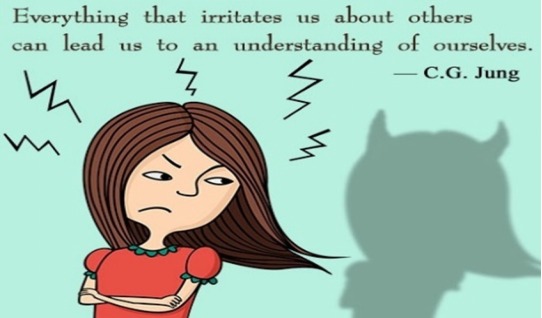
“Mirror, Mirror: The Intriguing Tapestry of Our Projections onto Others”
In the intricate dance of human interactions, we often unknowingly weave a complex tapestry of emotions, beliefs, and judgments. Our minds, ever eager to categorize and make sense of the world, project our own thoughts and feelings onto the people we encounter. This phenomenon, known as psychological projection, is a fascinating exploration of the human psyche, unveiling layers of understanding about ourselves and the intricate web of connections we share with others.
Have you ever noticed that the people around you sometimes seem like mirrors, reflecting back aspects of yourself that you may not be fully aware of? In this blog, we’ll delve into the concept of projection, explore its roots in psychology, and discover how understanding our projections onto others can lead to personal growth and better relationships.
Unpacking Projection: What Is It?
At its core, psychological projection is a defense mechanism, a subconscious way for our minds to cope with emotions and impulses that we find difficult to accept. When we project, we unconsciously ascribe our own attributes, desires, and fears onto others, creating a mirage of perceptions that often distorts reality.
when we project onto others, it serves as a coping mechanism to maintain our self-concept. It allows us to distance ourselves from negative aspects of ourselves while preserving our self-image as virtuous and flawless.For instance, when we admire someone’s confidence and assertiveness, we might be projecting our own desire to be more self-assured. Conversely, when we find ourselves intensely disliking someone, it may be because we’re projecting our own unresolved issues onto them.
The Play of Shadows and Light:
Our projections can cast both positive and negative shadows. In moments of joy and contentment, we tend to see the world through a positive lens, projecting our happiness onto others and assuming they share our elation. On the contrary, during times of inner turmoil or insecurity, our projections can manifest as judgment, envy, or suspicion, reflecting the unexplored corners of our own minds.
The Reflective Nature of Relationships:
Relationships, whether familial, romantic, or platonic, serve as profound mirrors reflecting our projections. Our interactions with others become a canvas where we project our hopes, dreams, and insecurities. Often, the traits we admire or despise in others are the very traits we possess within ourselves, waiting to be acknowledged and embraced. These are the parts of us which we have not recognized or acknowledged. However with acknowledgement and awareness we can deal with our projections
The Journey of Self-Discovery:
Recognizing our projections onto others offers a profound opportunity for self-discovery and personal growth. By unraveling the threads of our projections, we gain insights into our own subconscious, uncovering buried emotions and beliefs. Each projection becomes a signpost, guiding us toward the unexplored facets of our identity.
Compassion and Empathy:
Understanding the concept of projection cultivates compassion and empathy. Realizing that others project onto us just as we project onto them fosters a deep sense of connection. We become more forgiving, recognizing that everyone carries their own burdens and projections, making room for empathy and understanding in our interactions. As we become more attuned to our projections, we can respond to situations with conscious awareness rather than reacting impulsively.
The Dark Side of Projection: Disadvantages to Be Aware Of
While projection can offer valuable insights into our inner world, it’s essential to be aware of its potential drawbacks:
1. Misunderstandings:
Projecting our feelings and thoughts onto others can lead to misunderstandings. We may misinterpret their actions or words based on our projections, creating unnecessary conflicts or strained relationships.
2. Stagnation in Personal Growth:
If we’re unaware of our projections or unwilling to confront them, we risk stagnating in our personal growth. Ignoring our projections means missing out on valuable opportunities for self-reflection and improvement.
3. Damaged Relationships:
Unchecked projections can strain relationships. When we consistently attribute negative qualities to others, it can lead to resentment, distancing, and, ultimately, the breakdown of relationships.
4. Blind Spots:
Projecting our traits onto others can create blind spots in self-awareness. By avoiding self-reflection and projecting our flaws, we hinder our ability to address these issues constructively.
Practical Steps to Recognize and Manage Projection
- Self-Reflection: Regularly reflect on your thoughts and emotions. When you notice strong reactions to others, ask yourself if you might be projecting something onto them.
- Journaling: Keep a journal to record your feelings and thoughts. Reviewing your journal can help you identify patterns of projection.
- Seek Feedback: A therapist can provide valuable insights into your projections. They can offer a more objective perspective.
- Mindfulness and Meditation: These practices can help you become more attuned and aware of your inner thoughts and emotions, making projection easier to detect.
Conclusion: Embrace the Mirror
In the grand theater of life, our interactions with others often serve as mirrors reflecting back aspects of ourselves. Rather than dismissing these reflections or projecting our insecurities onto the world, we can choose to embrace them. By understanding projection and using it as a tool for self-awareness, we embark on a transformative journey of personal growth, deeper relationships, and greater authenticity in our interactions with others. So, the next time you catch yourself projecting onto someone else, take a moment to look in the mirror within; you might just discover something profound about yourself. Behavioural research says more than 60% of what we think of others is our own projection and has nothing to do with the behaviour of the other person.
